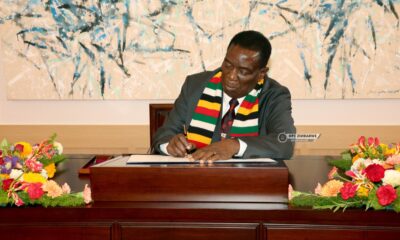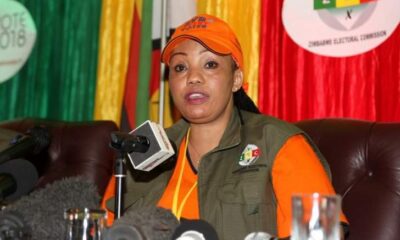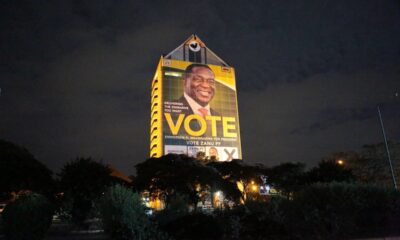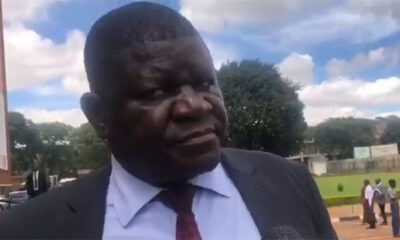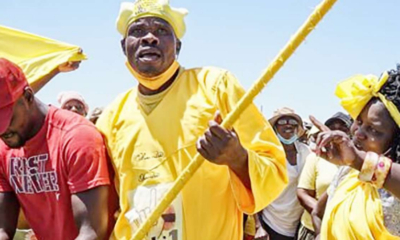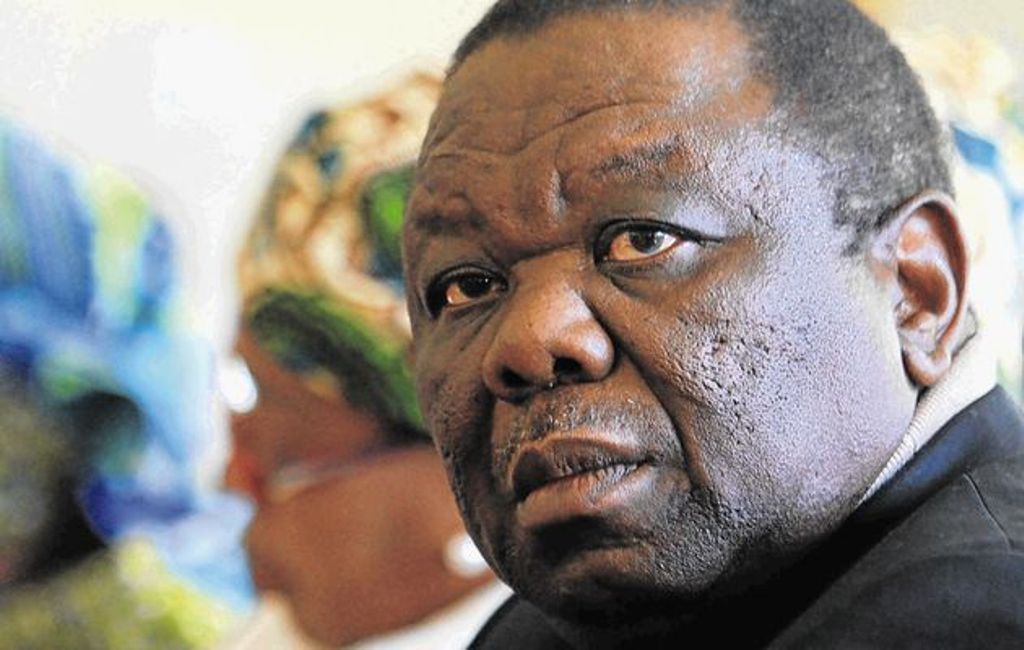
Opinion
Election dispute resolution must not be bogus
Published
12 months agoon
By
NewsHawksFABIAN MAUNGANIDZE
ELECTIONS are supposed to be a transparent way of selecting political leaders according to the will of the majority whilst considering the interests of the minority.
However, there are no perfect electoral processes and systems. Hence, the management of elections and perceived irregularities
in the electoral system used often leads to disputes that may need the courts to adjudicate (Mutangi, 2019).
The law and the courts are vital to prevent people from resorting to self-help when they want to address their grievances. Therefore, they provide a peaceful resolution platform for defusing tensions created by contested electoral outcomes (Nyamutata, 2012).
Ideally, election results should settle the issue of representation, but disputes often arise (Mutangi, 2019). It has been argued that challenges to the electoral outcomes are not necessarily an indication of weakness in the process, but rather an indicator of the openness and strength ofthe political system (Nyamutata, 2012; Petit, 2000). Like any process, the electoral process is not immune to violations and complaints. So, the availability of effective resolution systems buttresses the legitimacy and integrity of the election, although flaws may continue to exist (IFES, 2019; Mutangi, 2019; Nyamutata, 2012).
Even the established democracies like the United States of America have seen the results of their elections being challenged. One of the latest is the refusal by Donald Trump in 2020 to accept Joe Biden’s victory and taking the matter to court (BBC News, 2020). In Zimbabwe and Africa in general, opposition parties have launched numerous challenges to the outcomes of elections (Nyamutata, 2012; Siachiwena & Saunders, 2021).
However, in many cases, the courts have upheld the results of the elections despite the presence of flaws in the electoral processes (Siachiwena & Saunders, 2021). So, the framework for intervention of the judiciary in the electoral process is likely to impinge on the legitimacy and credibility of the elections in any country.
Zimbabwe has seen numerous court challenges to its electoral outcomes (Mutangi, 2019). In all the challenges, the judiciary has been playing an important election dispute resolution role, although other platforms are also involved. A significant positive step is the establishment of the Electoral Court to expedite the electoral dispute resolution process.
However, there is still room for improvement as the legal remedy for these disputes is still inadequate. Independent observers have highlighted the lack of clear legal appeals and complaints mechanisms in the Zimbabwean electoral laws (IFES, 2019). Using qualitative desk-based research methodology, we analyse some of the electoral disputes that have reached the courts in Zimbabwe, emphasising on the evolution of the role of the judiciary in the country’s electoral history.
Separation of powers
The concept of democracy hinges on the prevention of the excessive concentration of power by putting in place a system of separation of powers between the three arms of government, the executive, the legislature and the judiciary. This separation of powers divides political authority amongst the three arms and provides for checks and balances that prevent one arm of government from operating beyond its limits and tipping over into absolutism (Manyatera & Hamadziripi, 2013).
Of the three arms of government, the executive and legislature are directly elected into office, but the judiciary is not. This ideally makesthe judiciary non-partisan and impartial, but some can also argue that the intervention of an arm of government which in itself is not democratically elected , into a dispute of the legitimacy of a democratic process is questionable(Nyamutata, 2012; Tokaji, 2011). But it can also be argued that the very existence of an independent judiciary as a mediator of disputes and an arm that upholds the fairness of the law with impartiality, makes the judiciary the most suitable arbitrator for electoral disputes.
As Tokaji (2011) argues, normally the judiciary should not interfere in elections. However, where the ones in power are seeking to entrench themselves with no respect for democratic principles or where the rights of the minority are at stake, judicial activism is deemed necessary and the intervention of the judiciary is warranted (Tokaji, 2011).
Articles 3(1) and 3(5) of the African Charter on Democracy, Elections and Governance lay down the commitment of State Parties to the respect for human rights and democratic principles as well as the separation of powers. This commitment has been expressly provided for in the Zimbabwean Constitution of 2013 which dedicates at least 4 Chapters to the setting up of structures that ensure the separation of powers in the Zimbabwean system. In a webinar hosted by the Zimbabwe Election Support Network (ZESN) in 2021, Dr. Alex Magaisa, stressed the importance of the judiciary in the doctrine of separation of powers and its crucial function as a referee in the resolution of electoral disputes.
That is why the Zimbabwean Constitution as well as other legislation like the Electoral Act have given the judiciary the electoral dispute resolution (EDR) function to avoid leaving the trajectory of the disputes to the disputants themselves (ZESN, 2021).
The Constitution in Section 69(3) gives every person the right to “access [to] the courts, or to some other tribunal or forum established by law for the resolution of any dispute” including electoral disputes. However, there are other legal instruments that regulate EDR in Zimbabwe. Section 155(2)(e) of the Constitution is more specific to EDR requiring the State to “ensure the timely resolution of electoral disputes” therefore making the EDR a constitutional principle (LSZ, 2018).
Indeed, every electoral dispute needs to be resolved in the interests of justice. But justice is not a simple concept to fathom. Generally, justice is regarded as substantive or procedural. Whilst procedural justice involves the adherence to the process of fairness according to the set rules of law, substantive justice is more inclined on probing the justness of the laws (Nyamutata, 2012). Therefore, the justice that the disputants seek is dependent on whether it is according to the current laws (procedural) or the laws themselves are not just (substantive) or both.
It has been said that “justice must not only be done but also be seen to be done” and this is the standard that courts must meet during proceedings (Nyamutata, 2012). It is interesting that Zimbabweans’ levels of trust in the justice delivery system in EDR differ along party lines. The ruling Zanu PF party supporters have been found to trust the Zimbabwean courts whilst opposition supporters doubt the independence of the judiciary Kronke, 2018). This significantly affects the perception of justice in the same population.
Section 165(1) of the 2013 Constitution of Zimbabwe outlines the principles of justice as well as the role of the courts in safeguarding human rights, freedoms, the rule of law and ultimately, justice. Therefore, the courts in Zimbabwe are constitutionally tasked with enhancing the protection of the fundamental freedoms and human rights which the electoral process also seeks to preserve.
Judicial Independence
The doctrine of separation of powers is intricately connected to judicial independence since the judiciary superintends the checks and balances guaranteeing democracy. Therefore, the judiciary must be free from interference and independent of legislative or executive control. The courts ensure that the other two pillars of the state maintain respect for human rights, hence the courts must be free from interference whether perceived or actual.
This judicial independence can be “institutional independence” where there is no interference with the courts and judicial officers, or “individual independence” in which judicial officers are free to act impartially without external interference (Gordon & Bruce, 2016).
Judicial independence in EDR is often threatened when political actors attempt to ignore the country’s laws as a way of ensuring political survival (Kronke, 2018). In a ZESN webinar, Portia Kurima, one of the panellists bemoaned the Zimbabwean executive’s alleged hold on the judiciary saying that it leads to low confidence in the institution. In the same discussion, Professor Lovemore Madhuku claimed that the constitutional provisions giving the sitting
President the final say in the appointment of judges compromised the judiciary (ZESN, 2021).
Madhuku’s contention echoes the sentiments of Manyatera and Hamadziripi (2013) on the court’s decision in the 2013 case of Jealous Mawarire v Robert Mugabe which has been a subject of much debate focusing on judicial independence. It was argued that the judgement was merely to legitimise the executive’s desires, although the dissenting judges had grasped the correct interpretation of the Zimbabwean Constitution in this case. If the majority judgement was flawed, the question would be whether they were acting independently or under the influence of the executive.
When we consider the 2018 harmonised elections in Zimbabwe, the independence of the judiciary also comes onto the spotlight. Even before the elections, cases related to the elections were brought to the courts.
These included the Mavedzenge v Minister of Justice case where Zec’s lack of de jure independence from the Minister of Justice was challenged through an urgent chamber application in 2017. The hearing was delayed until a few weeks before the election and this was interpreted by some as a lack of independence. Moreover, delays in other judgements or the overturning of judgements in a way that seemed to benefit the ruling party were perceived as a lack of judicial independence (Kronke, 2018).
In the 2018 presidential election, the victory by Emmerson Mnangagwa over Nelson Chamisa was by less than 1% of more than 50% threshold for one to avoid a runoff. Chamisa alleged that there had been a fraudulent counting and tallying of the votes and petitioned the Constitutional Court of Zimbabwe (CCZ). The court however ruled that there was no sufficient and credible evidence proving the widespread presence of irregularities to warrant a change of the electoral outcome (Siachiwena & Saunders, 2021). It is within the power of the judiciary to come out with a finding that may or may not be popular, but this highly publicised case has reignited the debate on the independence of the judiciary in Zimbabwe.
Electoral disputes and judiciary
Zimbabwean Electoral Disputes and the Mediation of the Judiciary
The mediation of electoral disputes by the courts is provided for in both the Constitution and the Electoral Act. Section 167 of the Electoral Act entitles any aggrieved candidate to file a petition “complaining of an undue return or an undue election of a member of Parliament by reason of want of qualification, disqualification, electoral malpractice, irregularity or any other cause whatsoever”. Such petitions must be lodged within 14 days with the Registrar of the Electoral Court.
The Electoral Court of Zimbabwe (ECZ) hears the case and decides on whether the party which should have been declared the winner was duly elected or it was the other contestant. It is also possible for a rerun to be ordered in terms of Section 159 of the Constitution, which mandates the Zimbabwe Electoral Commission (ZEC) to hold new elections within 90 days of a vacancy (IFES, 2018).
In Zimbabwe, the judiciary has often been castigated for taking a partisan stance, but whether this is true depends on the analyst. A pan-African, non-partisan research network, Afrobarometer together with Mass Public Opinion Institute (MPOI) conducted a survey in 2018 interviewing more than 9,600 adult Zimbabwean citizens, looking at governance, democracy, economic conditions and other issues. They found that there was a general lack of independence that dampened the public’s trust in both Zec and the courts. However, the ruling Zanu PF supporters trusted Zec and the judiciary more than the opposition supporters (Kronke, 2018). This verdict on both the electoral management body (EMB) and the courts is definitely a bad one for institutions that are supposed to safeguard democracy.
Electoral disputes and appeals
The Electoral Act provides for the various jurisdictions of the courts for election-related complaints and violations in Zimbabwe. Part VI of the Electoral Act gives jurisdiction over “voter registration appeals” to “designated magistrates” although there seems to be no clarity as to who designates the magistrates. Parts XIA and XII of the Electoral Act gives jurisdiction over “candidate nomination appeals” to the ECZ, whilst the jurisdiction for “campaign disputes or violations” is given to the MultiParty Liaison Committees according to Part XXIA of the Electoral Act.
For “campaign expenditure disputes”, Part XVI of the Electoral Act grants jurisdiction to any “competent court” which may be a local magistrates’ court although there is no clear definition in the law. For petitions against results, Section 111 of the Electoral Act gives jurisdiction to the CCZ for presidential elections whilst the Electoral Court has jurisdiction for parliamentary and local elections in terms of Part XXIII of the Electoral Act. For the various election offences like corrupt practices, and intimidation or any other offences, the Electoral Act gives jurisdiction to the director of public prosecutions and the High Court (IFES, 2018).
Cases of election disputes
From independence, the Zimbabwean courts have received hundreds of election petitions, but only a few have succeeded. In 2013 alone, there were 101 petitions challenging the parliamentary election results, 95 were from the opposition Movement for Democratic Change (MDC) and 6 were from the ruling Zanu PF (Mutangi, 2019). Of these petitions, 99 were dismissed on technicalities and only 2 were determined on their merits. The issue of most election petitions not being determined on merit was explained by the court in Konjana v Nduna ECH 6/18 where it was emphasised that there was prioritisation of strict procedural compliance in cases of election petitions (USAID, 2019).
The Margaret Dongo case
In 1995, Margaret Dongo became the first person to challenge the results of an election in Zimbabwe and win against the ruling Zanu PF.
Dongo held the Sunningdale seat in Harare prior to the elections but fell out with the hierarchy of the party. She was replaced as party candidate by Vivian Mwashita, but she still contested as an independent candidate and narrowly lost the election. However, Dongo petitioned the court alleging vote rigging. The High Court ruled in her favour in August 1995 and ordered fresh voting in the district which she won.
The Dongo v Mwashita case has since opened the flood gates of election petitions that have characterised the political landscape in Zimbabwe (Dorman, 2003).
The Priscilla Misihairabwi Case
In the 1996 municipal elections, an NGO activist Priscilla Misihairabwi, wanted to contest after having compiled a dossier highlighting the fraudulent voter registrations in Harare’s Avenues district. She exposed the flawed electoral rolls showing that hundreds of voters purported to be residing on evidently vacant lots were registered. Her candidacy was declared invalid by the Registrar-General, Tobaiwa Mudede and she appealed to the Supreme Court which quashed the Registrar-General’s decision and declared that Misihairabwi had the right to contest in the elections. This was a remarkable ruling by the court as it delved into themerits of the case and boldly overruled the Registrar-General’s decision (Dorman, 2003).
The Fidelis Mhashu case
In a case similar to the Misihairabwi case, the High Court also held in favour of Fidelis Mhashu in the Mhashu v Chiroodza & Others HH 43-97 case. After losing in the ruling Zqnu PF primary elections and failing to represent the party, Mhashu contested the mayoral election in Chitungwiza as an independent candidate.
He however successfully petitioned the High Court claiming that the electoral roll for Chitungwiza “was so defective that it cannot be said that the electoral process was itself not flawed” because the roll comprised only of homeowners in the area, even though it was evident that most residents were tenants (Dorman, 2003).
This was another successful petition which supports the independence of the Zimbabwean judiciary in electoral dispute mediation.
The Morgan Tsvangirai case
In Registrar General of the Elections & Ors v Morgan Tsvangirai 2002 (1) ZLR 185, a presidential candidate, Morgan Tsvangirai representing the MDC sought an order from the High Court compelling the RegistrarGeneral to ensure the preparation of a common voters roll for the 2002 presidential election containing only the names of the persons entitled to vote. The contention was that presidential elections are not constituency-based therefore, proof of residency in a specific constituency was unnecessary.
The High Court then ruled in Tsvangirai’s favour, but the Registrar-General appealed to the Supreme Court which set aside the reasoning of Makarau J in the High Court. Many have been perplexed by this unusual reasoning of the Supreme Court since the presidential elections are national and proving residency in a particular constituency seems unnecessary.
The Madzingo case
In Madzingo & Ors v Minister of Justice 2005 (1) ZLR 171 (SC), Malaba JA dismissed the application noting that “notwithstanding, its importance elections. This was a remarkable ruling by the court as it delved into the merits of the case and boldly overruled the Registrar-General’s decision (Dorman, 2003).
The Fidelis Mhashu Case
In a case similar to the Misihairabwi case, the High Court also held in favour of Fidelis Mhashu in the Mhashu v Chiroodza & Others HH 43-97 case. After losing in the ruling Zanu PF primary elections and failing to represent the party, Mhashu contested the mayoral election in Chitungwiza as an independent candidate.
He however successfully petitioned the High Court claiming that the electoral roll for Chitungwiza “was so defective that it cannot be said that the electoral process was itself not flawed” because the roll comprised only of homeowners in the area, even though it was evident that most residents were tenants (Dorman, 2003).
This was another successful petition which supports the independence of the Zimbabwean judiciary in electoral dispute mediation.
The Morgan Tsvangirai case
In Registrar General of the Elections & Ors v Morgan Tsvangirai 2002 (1) ZLR 185, a presidential candidate, Morgan Tsvangirai representing the MDC sought an order from the High Court compelling the Registrar-General to ensure the preparation of a common voters roll for the 2002 presidential election containing only the names of the persons entitled to vote. The contention was that presidential elections are not constituency-based therefore, proof of residency in a specific constituency was unnecessary.
The High Court then ruled in Tsvangirai’s favour, but the Registrar-General appealed to the Supreme Court which set aside the reasoning of Makarau J in the High Court. Many have been perplexed by this unusual reasoning of the Supreme Court since the presidential elections are national and proving residency in a particular constituency seems unnecessary.
The MDC case
In the presidential elections in 2008, Zec failed to announce the results of the election for up to 6 weeks, claiming that it needed to carry out the verification process efficiently and accurately before announcing results.
When Zec failed to announce the results 6 days after the elections, the MDC made an urgent chamber application to the High Court seeking to compel Zec to announce the results.
The MDC & Morgan Tsvangirai v Chairperson of the Zimbabwe Electoral Commission & Ors [2008]
ZWHHC 37 case was heard by Uchena J, 7 days after the election, on 5th of April 2008 and the judgement was delivered 9 days after the hearing, on 16th of April 2008. Even then, the ZEC had not yet announced the results although it was 16 days after the election. The Zec’s initial arguments that the court had no jurisdiction and that the matter was not urgent were both rejected by the court.
However, the claim of accurately verifying the results and the claim by the commission chairperson that they had received complaints which made it necessary to consider a recount of the votes in some constituencies and that the recounting decision was at Zec’s absolute discretion was accepted by the court.
The court further held that it did not have the jurisdiction to inquire into Zec’s decision. So, the MDC application was dismissed. Whether this decision holds water in light of section 156(b) of the 2013 constitution is debatable because the subsection compels Zec to ensure that “the results of the election or referendum are announced as soon as possible after the close of the polls”.
The Jealous Mawarire case
In Jealous Mawarire v Robert Mugabe N.O. and 4 Others CCZ 1/13, there was a petition for the court to declare that elections be held not later than 30 June 2013. This was on the backdrop of the government of national unity (GNU) where electoral reforms were agreed to be put in place before the 2013 elections to ensure that they are free, fair and credible.
Unfortunately, Zanu PF stalled the electoral reforms, but still wanted the elections to go ahead without the reforms, although the opposition wanted the elections to be held by 30 October after electoral reforms. A citizen then petitioned the court in May 2013, to order the then President Robert Mugabe to announce a date for elections which had to be held by 29th of June 2013.
The court needed to interpret the meaning of section 58(1) of the constitution which grammatically means that elections should be held ‘within’ four months ‘after’ the dissolution of Parliament. Although the court admitted that this was the grammatical meaning in its majority judgement, it however adopted a purposive meaning claiming that the grammatical meaning would be an absurd interpretation which would allow Zimbabwe to be governed without the legislature for 4 months and this could not have been the intention of the framers of the constitution.
However, in his minority dissenting judgement, Malaba DCJ heavily criticised the majority judgement for being essentially a political judgement because it was contrary to the Constitutional provision. The president then announced the date claiming that his hands were tied although Sadc requested a postponement of the elections (Mavedzenge, 2020).
The Justice Mavedzenge case
In the Mavedzenge v Minister of Justice CCZ 05/18 case, the court also took a purposive interpretation of section 232(a) of the 2013 constitution which gives ZEC the exclusive mandate for elections administration.
However, Section 192(6) of the Electoral Act provides for the approval of Zec’s electoral regulations by the Minister of Justice before they can come into effect. Mavedzenge then petitioned the court seeking a declaration that Section 192(6) of the Electoral Act is unconstitutional.
The matter dragged for almost a year, being heard on 5th of July 2017 and the judgement only being delivered on 31st of May 2018. This was just 2 months before the 2018 general election. The applicant contented that considering the literal meaning of section 192(6) prevented the independent promulgation of electoral regulations by Zec since it required the Minister’s approval first before proclaiming regulations. Hence, the Minister can literally approve or disapprove Zec’s draft regulations.
The court rejected this grammatical interpretation, adopting a purposive interpretation and holding that the provision does not imply the enjoyment of veto power by the Minister, but that he simply had to check the draft regulations for compliance with the law. It has been argued that this interpretation and decision by the court undermined the independence of Zec (Mavedzenge, 2020). It remains open to debate whether this decision by the CCZ was in the interests of justice since it has opened the judiciary to criticism.
The Gabriel Shumba case
The decision by the Constitutional Court in May 2018 in the case of Gabriel Shumba & 2 Ors v Minister of Justice, Legal and Parliamentary Affairs (2018) ZWCC 4 has upheld the contentious decisions in a few other cases before it. An application was made to the court seeking an order compelling Zec to cater for the voting of Zimbabwean citizens residing outside the country (in the diaspora). The court held that only those who are resident in a certain constituency are given the opportunity to vote in a particular election. This is despite the fact that Part XIV of the Electoral Act is liberal enough to allow diplomats stationed outside Zimbabwe and their spouses to vote by post (IFES, 2018). This means that the facility is there and can be availed to all citizens in the diaspora, but it is currently restricted to those out on state business alone.
This reasoning especially for the presidential elections is similar to that of the Supreme Court in the Tsvangirai case of 2002 above. Even where a voter is registered in a constituency, there is no provision for him or her to vote whilst outside the country because the registration is not only constituency-specific but also polling station-specific. This argument is similar to the Madzingo case above.
The Gift Machona Konjana case
The case of Gift Machona Konjana is a result of a botched tallying of parliamentary election results for the Chegutu West Constituency National Assembly seat during the 2018 harmonised elections in Zimbabwe. The applicant claimed that Zec incorrectly captured data resulting in Dexter Nduna of Zanu PF being declared winner even though he had fewer votes than the applicant Gift Konjana of the MDC Alliance.
Even Zec confirmed that there had indeed been a mistake. On petitioning the Electoral Court for a nullification of the result, the court dismissed the petition for failure to comply with Rule 21 of The Electoral Rules. It was held that the court could not condone a defective petition even where the petition may seem to have merit. Konjana appealed to the Supreme Court which ruled that the election petition should have been concluded within 3 months as prescribed by Section 182(2) of the Electoral Act.
It was further held that the stipulated period of 3 months could not be exceeded under any circumstances, so the case was struck off the roll. Konjana then applied to the Constitutional Court in Konjana v Nduna CCZ 9/21 and the court held that the applicant had failed to demonstrate the constitutionality of the matter.
The court stressed that the Supreme Court decision could not be appealed against since it is the final court of appeal in Zimbabwe, except in those matters stipulated in Section 169(1) of the Constitution, over which the Constitutional Court has jurisdiction. The court blamed the applicant and his lawyers for failing to handle the case properly and held that “it would be improper to expect the court to bend the rules and seek to rectify the situation in this application as that would set a bad precedent”.
This unfortunate case exposed the incompetence of the systems in Zec whilst showing the level of adherence of the court system to strict rules which every petitioner is supposed to observe. That is why many cases end up being dismissed for technicalities rather than on merits.
Conclusion and recommendations
The cases considered here just enlighten on the role of the judiciary in elections. The claims of partisan tendencies by the judiciary may not be completely unfounded, but they should be taken in context. Ultimately, justice must not only be done but must also be seen to be done. The
judiciary must have absolute independence so that there is unwavering trust in the fairness of any adjudication that may be required from the courts. Court decisions should not seem dubious, especially where there is a general observable trend towards the support for the interests of one party.
It is therefore our recommendation that:
. the election petition process and the whole EDR be simplified so that there are fewer technical bottlenecks that complicate the process.
. the Electoral Court be a permanent court that can hear all matters before, during and after elections.
. the appointment, dismissal and remuneration of judges be free from political influence.
. enough funding be availed for the efficient and expeditious resolution of electoral disputes through reasonable caseloads.
. there be alignment of electoral laws with the Constitution so that there be no ambiguity which may affect the quality of the judicial decisions during EDR.
. there be a sober and non-partisan approach to EDR by all independent institutions including ZEC and the courts.
About the writer: Dr Fabian Maunganidze is a pastor, lawyer, scientist and lecturer. He is currently the Deputy Dean of the Faculty of Medicine and Health Sciences and the chairperson of the Department of Physiology at Midlands State University in Gweru.

